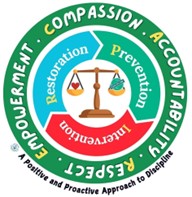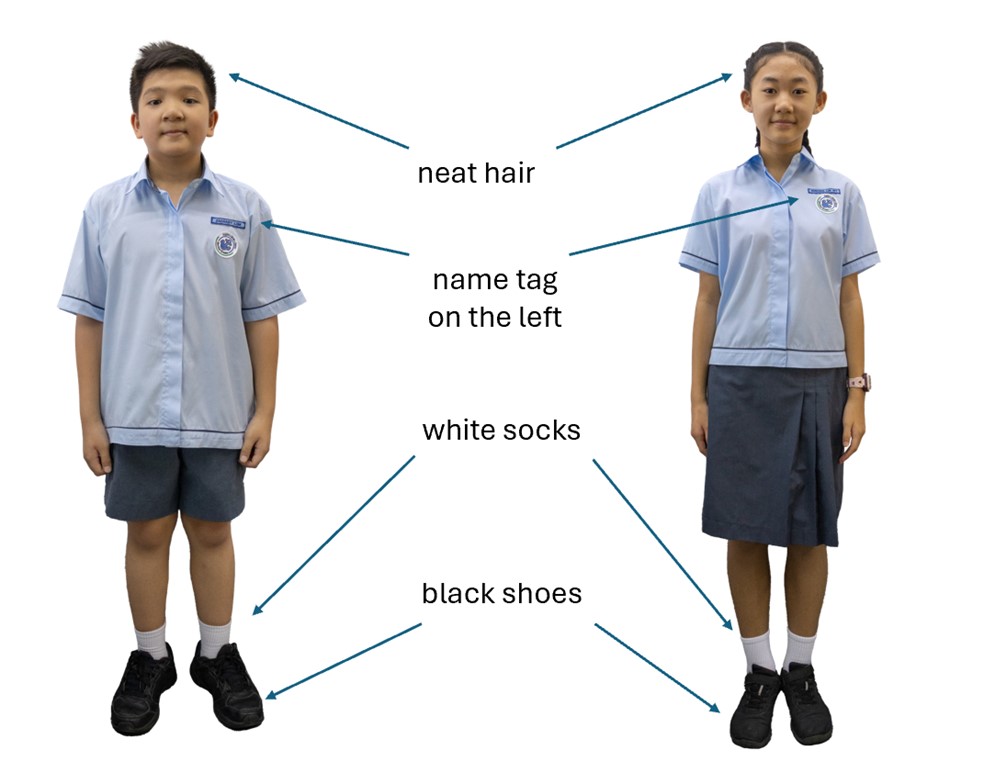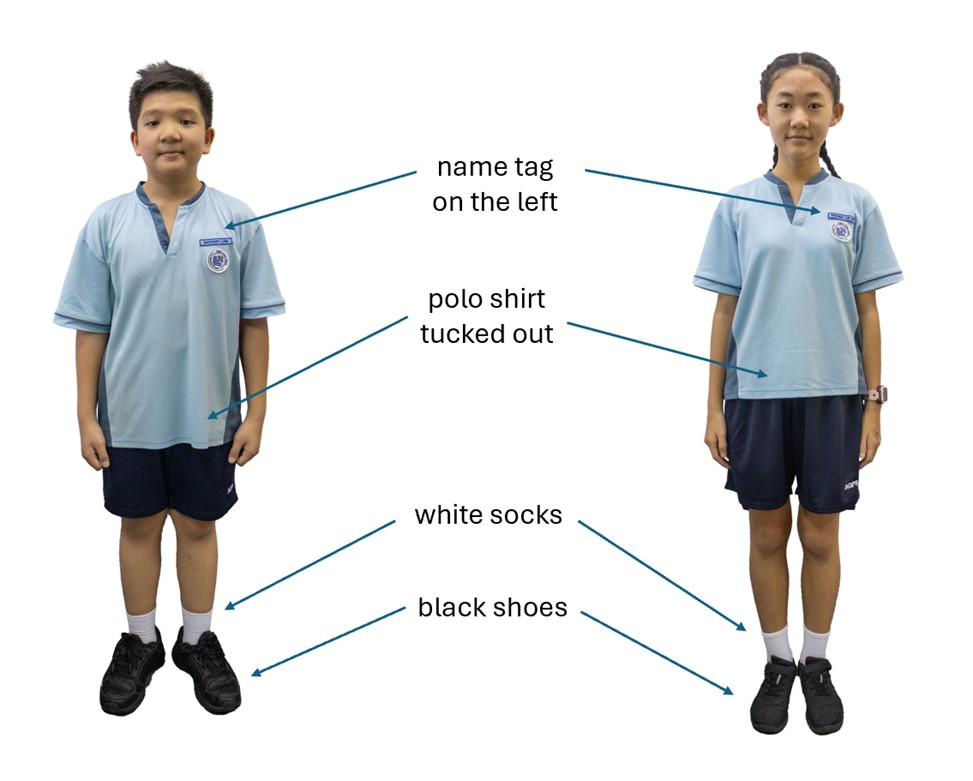Discipline Philosophy and School Rules
Discipline Philosophy and School Rules
Discipline Philosophy and Approach
Framework:

At the core of the framework, the balance symbolises equilibrium and fairness, suggesting the careful weighing of disciplinary actions with empathy and consideration for individual circumstances. This communicates the idea of maintaining discipline while also showing care and empathy towards those involved. It reinforces the concept of discipline not merely as enforcement but as a supportive and nurturing process.
Philosophy:
AGPS believes that discipline should not focus on consequences, but about fostering a positive learning environment where all students can thrive. We embrace the concept of "Discipline with CARE," which emphasises guidance, support, and the development of self-regulation skills. This philosophy is grounded in the acronym CARE, with restorative practices integrated throughout:• Compassion: We approach students with empathy and understanding, recognizing that behavior can stem from a variety of factors. We utilise restorative practices to create a safe space for students to express their feelings and perspectives when addressing misconduct.
• Accountability: We hold students accountable for their actions in a way that promotes reflection and growth. This may involve restorative practices like conferencing or circles, where students can take ownership of their behavior and the impact it had on others.
• Respect: We treat all members of our school community with respect, fostering positive relationships and a sense of belonging. Restorative practices, like mediation, encourage respectful dialogue and help rebuild trust after conflict.
• Empowerment: We empower students to make positive choices and develop the skills necessary for self-discipline. Restorative practices provide opportunities for students to learn from their mistakes, repair harm caused, and contribute to solutions.
Approach:
Our school-wide discipline approach focuses on Prevention, Intervention, and Restoration, with restorative practices woven into the process:• Prevention: We actively promote a positive school climate through clear expectations, positive reinforcement, and student well-being programmes. Our school-wide approach to enhancing student well-being is further strengthened by a positive education framework developed by Noble & McGrath, known as the P.R.O.S.P.E.R framework. This framework empowers students to make positive choices and thrive both academically and personally.
• Intervention: We enforce discipline consistently, ensuring fairness. When misconduct occurs, we prioritise restorative practices as our primary intervention strategy. Teachers will facilitate conferences or mediations. This allows students to directly address the harm caused, identify underlying issues that may have contributed to the behavior, and collaboratively develop a plan to address the misconduct. This approach ensures we promptly address inappropriate behavior while also promoting empathy, accountability, and sustainable positive change. The focus is on helping students develop self-discipline and good character.
• Restoration: Restorative practices remain central even when implementing consequences. Consequences may still be necessary, but they will be chosen with a restorative lens, such as Behavioural Corrective Duty (BCD) or Reflection Time (RT) that contribute to repairing the harm. * Students may be required to participate in conferences or mediation to understand the impact of their actions and contribute to repairing the harm caused. Teachers will work with students to replace inappropriate behaviors with prosocial ones and restore relationships with those impacted by their actions.
*Disciplinary consequences such as suspension and caning are considered in combination or separately, depending on the circumstances of each case.
Our School Rules
1. General Conduct
Students are expected to:
• Exhibit the A.N.C.H.O.R values - Agility, iNtegrity, Care, Humility, Optimism and Resilience.
• Be polite and well-behaved at all times in and outside of school.
• Greet all members of Anchor Green Primary School community – teachers, non-teaching staff, parents and visitors politely.
• Move quietly and in an orderly manner when moving around the school.
• Handle all school equipment and property with care.
• Keep the classrooms and school premises clean at all times.
• Observe safety at all times.
2. Attendance and Punctuality
• Daily attendance is compulsory.
• Please do not send your child to school if he/she is unwell and please call the school to inform his/her Form Teacher of your child’s absence.
• Absenteeism must be covered by a Medical Certificate from a doctor OR a letter with valid supporting document.
• A valid Medical Certificate, from a clinic registered with the Singapore Medical Council, must be submitted via PG to your child’s/ward’s Form Teacher if he/she has missed any scheduled assessments.
• An automated message will be sent via SMS and PG to the student’s parent/guardian should a student be absent from school.
• Please upload relevant supporting documents (e.g. MC) or update reason for your child’s/ward’s absence via PG.
• Students are to report at the assembly venue for flag raising by 7.20am.
• Students who arrive at the assembly area after 7.30am will be marked as ‘Late’.
• Students are to participate and be punctual for school and all designated school activities.
• Students must complete the full school term. Prolonged and frequent absence from school will hamper a child’s learning and development. In addition, this may have an impact on his/her Holistic Development Profile (HDP) Report unless, the absence is due to valid reason(s) (e.g. Medical Leave).
• Students’ Holistic Development Profile (HDP) and Conduct Grade (CG) report will also be affected should he/ she not adhere to the above-mentioned rules relating to attendance and punctuality.
3. Assembly/Pledge Taking
• Students who are Singapore Citizens must sing the National Anthem and take the Pledge. Students will recite the Pledge with their right fist placed over their heart.
• All students are required to sing the school song.
• Students are to observe all the commands for assembly without fidgeting.
• It is mandatory for all students to uphold the integrity of the flag raising ceremony.
4. Classroom Conduct
• Students are required to stand and greet the teachers before and after lessons.
• No food and sweet drinks are to be consumed in the classroom except during the prescribed snack time. Only plain water is allowed to be consumed in class outside of the prescribed snack time.
• No student is to remain in the classroom during recess.
• No student is to leave the classroom without the teacher’s permission.
5. Attire and Appearance
• Students should be properly and neatly attired at all times. Students are to wear the prescribed school uniform and no modification to the uniform is allowed.
• Sweaters (only blue or black) may be worn only when the weather is cold (e.g. on rainy days in the morning). Should there be extenuating circumstances, the school can consider the request on a case-by-case basis.
• Students are allowed to wear their PE attire to school on days where they have PE lessons and/or Co-Curricular Activities. (Refer to the page 9 of the student’s handbook for the examples.)
School Uniform
 PE Uniform
PE Uniform

| School Attire Guidelines | |
| Hair |
Fringe
- Fringe must be neat and kept above the eyebrows (for both and girls) - To pin up long fringe (for girls) Length - Long hair (below the collar) must be tied up and plaited neatly (for girls) in a ponytail or bun. - Hair must be kept short and neat (for boys) - Fanciful hairstyle is not allowed Facial Hair - All male students must be clean-shaven at all times. Moustache and beard are not allowed. Grooming - Hair must not be tinted or dyed (for girls) - Hair must not be tinted, dyed or spiked (for boys) Hair Accessories - All hair accessories must be black or navy blue and not jeweled. (girls) |
| Attire |
Uniform / PE Attire
- School uniform must be of appropriate size - Shorts and skirts must be of knee length - Students are not required to tuck-in their School Uniform and PE Polo T-Shirt. Socks - Ankle socks are not allowed - Socks should be above ankle length Shoes - Black canvas shoes. - No sports shoes except on CCA days after Curriculum hours or when student is participating in competition. - Slip-ons are not allowed Name Tag - Name tag should be ironed / sewn on the left side of the school uniform and PE T-shirt. |
| Accessories |
- Only small black or dark blue ear studs are allowed - for female students
only.
- Colourful and/or multiple ear studs are not allowed. - Students are not allowed to wear wrist or friendship bands, jewellery or accessories of any kind to school for uniformity and safety reasons |
| Nails |
- Nails must be kept short and clean
- No nail polish is allowed |
6. Permission to leave school/country during Curriculum/Term Time
• No student is allowed to leave the country during the school term. For urgent cases, written permission must be sought from the school through the Year Head and is subjected to approval by the School Leaders. Parents are to check the school calendar before planning their vacation and purchasing the plane tickets.
7. Possession of Weapons
• Students are not allowed to have in their possession any weapon. They are also not allowed to bring any weapon-like item which is intended to be used to cause harm to others.
• All sharp edged and pointed objects such as scissors, pen-knives, cutting blades, paper cutters, including weapon-like toys such as toy guns, toy knives etc. are strictly prohibited.
8. Mobile Phone/Smart Watches Policy
• The school does not encourage students to bring mobile phones to school.
• For the safety and security of all students, smart watches are not allowed in school. Students are encouraged to wear a standard wristwatch.
• Smart watches with non-telecommunication features, e.g., POSB Smart Buddy Watch which allows contactless payment, are permitted.
• Parents who would like their child to carry a mobile phone must take personal responsibility. The school will not be responsible for any loss or damage to the mobile phones or smart watches.
• Students are not allowed to use their mobile phones during school hours, including recess, CCAs, and after-school programmes (e.g supplementary, enrichment, or remedial lessons).
• If necessary, students are only allowed to use smartphones in designated areas after school hours (near Gate 1 and Gate 3) solely for communicating with parents or caretakers.
• Students’ mobile phones may be confiscated as a disciplinary measure and/or for the purpose of investigation if students contravene the above rule.
Types of Minor and Major Offences
| Types of Minor Offences | Possible Actions and Consequences |
|---|---|
| • Late coming (being late for school with no valid reason) • Failure to complete assignment • Littering • Improper attire/grooming (disobeying school rules on attire, hairdo, jewellery, etc) • Use of vulgar language (verbalising coarse or abusive language) • Vandalism (minor defacing of school property such as writing on desks and walls) |
• Verbal warnings • Recess play restrictions • Supervised recess • Counselling • Conferencing between teachers and parents • Drop in conduct grade • Behaviour contract • Cleaning of property or paying for any item damaged upon proof of offence • Any other actions deemed appropriate by School Leaders |
| Types of Major Offences | Possible Actions and Consequences |
| • Skipping class (present in school but fails to attend lesson) • Leaving school grounds without permission during school hours (leaving school grounds after reporting but before end of the school session without the school’s approval) • Truancy (being absent from school without a valid reason during school days (Mon-Fri)) • Forgery (forging signatures, medical certificates, consent forms, etc. with the intention to deceive) • Cheating in assessments/tests/examinations (possessing notes, or other prohibited items, copying from others, allowing others to copy, tampering with marks/answers) • Disruptive behaviour (interfere with smooth running of class or school events) • Open defiance and/or rudeness (refusing to conform to school rules, norms and practices; disobeying teacher’s instructions; displaying rudeness and disrespect in speech and body language) • Hurtful behaviour/bullying (hurting, frightening or intimidating others to deliberately harm, distress or humiliate. Physical, verbal, social, cyber and psychological.) • Arson (planting explosives or setting property on fire, whether attempted or actual) • Theft (stealing school property or property belonging to others) • Vandalism – level 2 (vandalising school or personal property, writing graffiti) • Assault (attacking others violently, whether causing hurt or not) • Fighting (being involved in a confrontation between individuals or opposing groups in which each attempt to harm or gain power over the other, as with bodily force or weapons) • Gambling (using money in games, betting, etc.) • Gangsterism (being involved in a gang assault/threat/harassment/extortion, whether actual or attempted) • Pornography (possessing/consuming/distributing/selling materials) • Possession of weapon(s) and sharp objects (that may be used in crime) • Sexual misconduct (being involved in attempted rape, outrage of modesty, underage sex, sexual grooming, peeping, etc.) • Smoking/Vaping (using/possessing/distributing/selling) • Voyeurism (involved in watching others to gain pleasure) • Types of Abuse (a) Alcohol (consuming/possessing/distributing/ selling) (b) Drug (consuming/possessing/distributing/selling) (c) Inhalant (using/possessing/distributing/selling) • Others (other serious offences that do not fall in above categories. School to describe offence.) |
• Verbal/stern warnings • Recess play restrictions • Supervised recess • Counselling • Conferencing between teachers, parents and/or school leaders • Reflection Time (in timeout room for up to 2 hours) • Timeout (1/2 to up to 2 days) • Behaviour contract • Probation or removal from any leadership position • Suspension (in-school, from CCA and home) • Drop in conduct grade • Cleaning of school property or paying for any item damaged upon proof of offence • Record in the School Offence Module (SOM) • External agency referral • Caning • Expulsion • Any other actions deemed appropriate by School Leaders |

